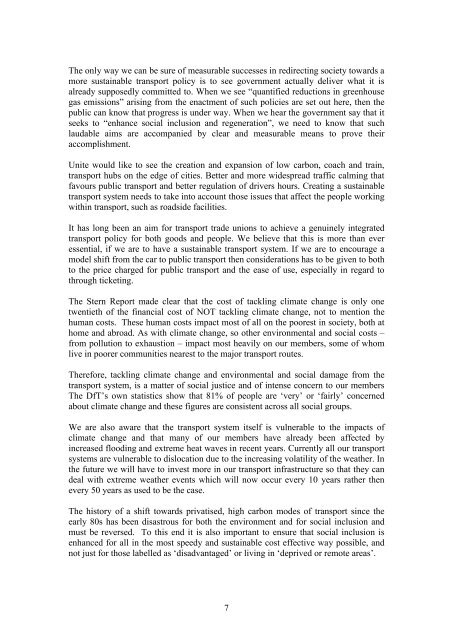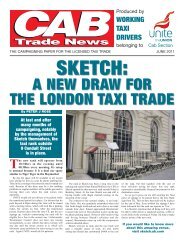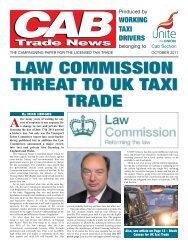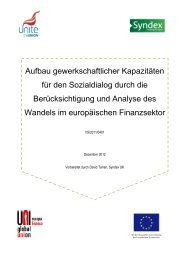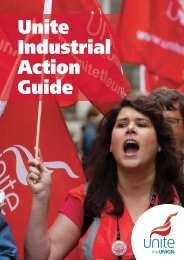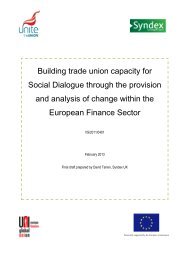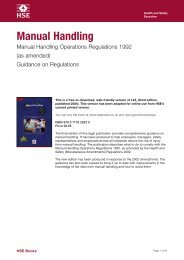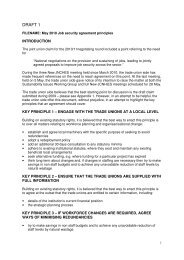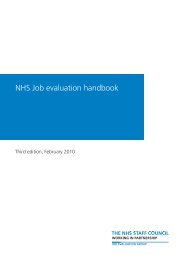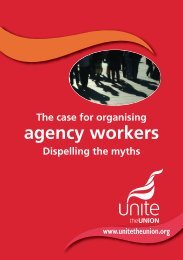Sustainable Transport and the Environment Guide - Unite the Union
Sustainable Transport and the Environment Guide - Unite the Union
Sustainable Transport and the Environment Guide - Unite the Union
Create successful ePaper yourself
Turn your PDF publications into a flip-book with our unique Google optimized e-Paper software.
The only way we can be sure of measurable successes in redirecting society towards a<br />
more sustainable transport policy is to see government actually deliver what it is<br />
already supposedly committed to. When we see “quantified reductions in greenhouse<br />
gas emissions” arising from <strong>the</strong> enactment of such policies are set out here, <strong>the</strong>n <strong>the</strong><br />
public can know that progress is under way. When we hear <strong>the</strong> government say that it<br />
seeks to “enhance social inclusion <strong>and</strong> regeneration”, we need to know that such<br />
laudable aims are accompanied by clear <strong>and</strong> measurable means to prove <strong>the</strong>ir<br />
accomplishment.<br />
<strong>Unite</strong> would like to see <strong>the</strong> creation <strong>and</strong> expansion of low carbon, coach <strong>and</strong> train,<br />
transport hubs on <strong>the</strong> edge of cities. Better <strong>and</strong> more widespread traffic calming that<br />
favours public transport <strong>and</strong> better regulation of drivers hours. Creating a sustainable<br />
transport system needs to take into account those issues that affect <strong>the</strong> people working<br />
within transport, such as roadside facilities.<br />
It has long been an aim for transport trade unions to achieve a genuinely integrated<br />
transport policy for both goods <strong>and</strong> people. We believe that this is more than ever<br />
essential, if we are to have a sustainable transport system. If we are to encourage a<br />
model shift from <strong>the</strong> car to public transport <strong>the</strong>n considerations has to be given to both<br />
to <strong>the</strong> price charged for public transport <strong>and</strong> <strong>the</strong> ease of use, especially in regard to<br />
through ticketing.<br />
The Stern Report made clear that <strong>the</strong> cost of tackling climate change is only one<br />
twentieth of <strong>the</strong> financial cost of NOT tackling climate change, not to mention <strong>the</strong><br />
human costs. These human costs impact most of all on <strong>the</strong> poorest in society, both at<br />
home <strong>and</strong> abroad. As with climate change, so o<strong>the</strong>r environmental <strong>and</strong> social costs –<br />
from pollution to exhaustion – impact most heavily on our members, some of whom<br />
live in poorer communities nearest to <strong>the</strong> major transport routes.<br />
Therefore, tackling climate change <strong>and</strong> environmental <strong>and</strong> social damage from <strong>the</strong><br />
transport system, is a matter of social justice <strong>and</strong> of intense concern to our members<br />
The DfT’s own statistics show that 81% of people are ‘very’ or ‘fairly’ concerned<br />
about climate change <strong>and</strong> <strong>the</strong>se figures are consistent across all social groups.<br />
We are also aware that <strong>the</strong> transport system itself is vulnerable to <strong>the</strong> impacts of<br />
climate change <strong>and</strong> that many of our members have already been affected by<br />
increased flooding <strong>and</strong> extreme heat waves in recent years. Currently all our transport<br />
systems are vulnerable to dislocation due to <strong>the</strong> increasing volatility of <strong>the</strong> wea<strong>the</strong>r. In<br />
<strong>the</strong> future we will have to invest more in our transport infrastructure so that <strong>the</strong>y can<br />
deal with extreme wea<strong>the</strong>r events which will now occur every 10 years ra<strong>the</strong>r <strong>the</strong>n<br />
every 50 years as used to be <strong>the</strong> case.<br />
The history of a shift towards privatised, high carbon modes of transport since <strong>the</strong><br />
early 80s has been disastrous for both <strong>the</strong> environment <strong>and</strong> for social inclusion <strong>and</strong><br />
must be reversed. To this end it is also important to ensure that social inclusion is<br />
enhanced for all in <strong>the</strong> most speedy <strong>and</strong> sustainable cost effective way possible, <strong>and</strong><br />
not just for those labelled as ‘disadvantaged’ or living in ‘deprived or remote areas’.<br />
7


